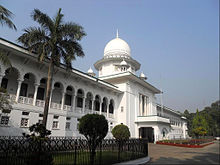Bangladesh is ranked by Freedom House as "Partly Free" in its Freedom in the World report.[184] Press freedom in Bangladesh is ranked as "Not Free".[185] The Economist Intelligence Unit classifies the country as a hybrid regime, which is the third best rank out of four in its Democracy Index.[186] Bangladesh ranked as the 3rd most peaceful country in South Asia in the Global Peace Index in 2015.[187] In recent years, the once vibrant civil society and media in Bangladesh have come under attack from both the ruling Awami League government and far-right Islamic extremists.[188]
According to Mizanur Rahman, the chairman of the National Human Rights Commission, 70% of the allegations of human rights violations they receive are against the law-enforcement agencies.[189] Targets have includedNobel Peace Prize winner Muhammad Yunus and the Grameen Bank,secularist bloggers, independent and pro-opposition newspapers and television networks. The United Nations has said that it was deeply concerned by the government's "measures that restrict freedom of expression and democratic space".[188]
Bangladeshi security forces, particularly the Rapid Action Battalion (RAB), have faced strong international condemnation for human rights abuses, including enforced disappearances, torture andextrajudicial killings. Over 1,000 people have been killed in extrajudicial killings by RAB since its inception under the lastBNP government.[190] The agency has been singled out by Human Rights Watch and Amnesty International as a "death squad".[191][192] They have called for the force to be disbanded.[191][192] The British and American governments have been widely criticized for funding and engaging the force in counter-terrorism operations.[193]
In the Chittagong Hill Tracts, the government is yet to fully implement the Chittagong Hill Tracts Peace Accord.[194] The Hill Tracts region remains heavily militarized despite the signing of the peace treaty with indigenous people led by theUnited People's Party of the Chittagong Hill Tracts.[195]
Secularism in Bangladesh is legally enshrined in the constitution. Religious parties are banned from contesting elections, but the government is accused of courting religious extremist groups for votes. Ambiguities over Islam being the state religion have been criticized by the United Nations.[196] Despite relative inter-religious and communal harmony, minorities in Bangladesh have faced persecution on occasions. The Hindu and Buddhist communities have facedreligious violence from Islamic groups, notably the Jamaat-e-Islami and its student wing Shibir. The highest vote share achieved by Islamic far right candidates during Bangladeshi elections was 12% in 2001; the lowest was 4% in 2008.[197]


No comments:
Post a Comment